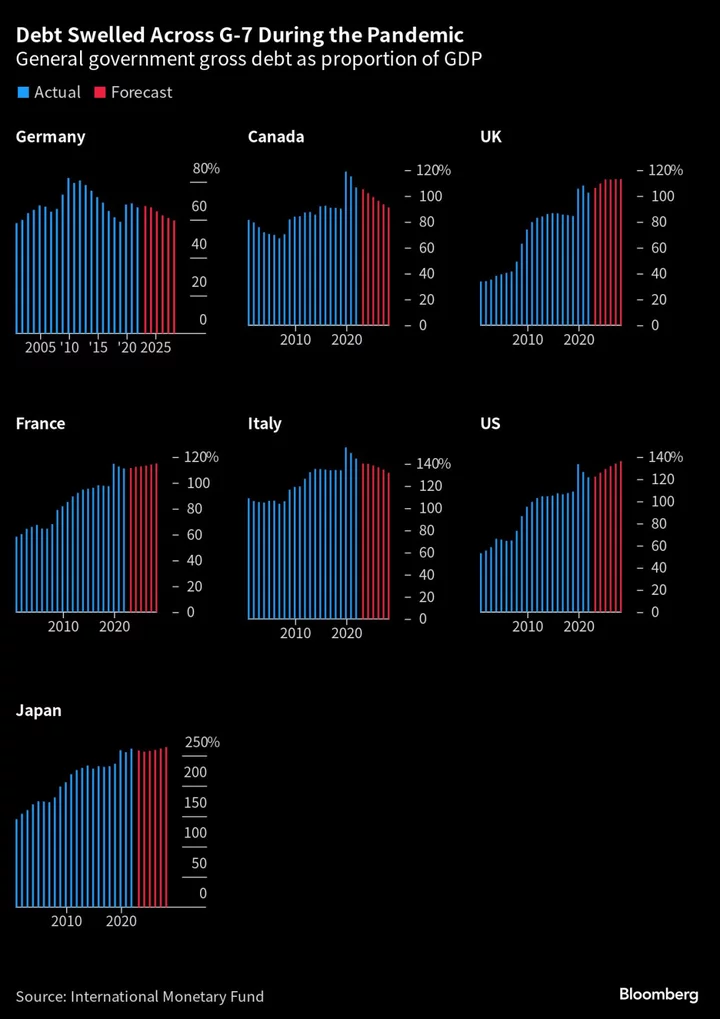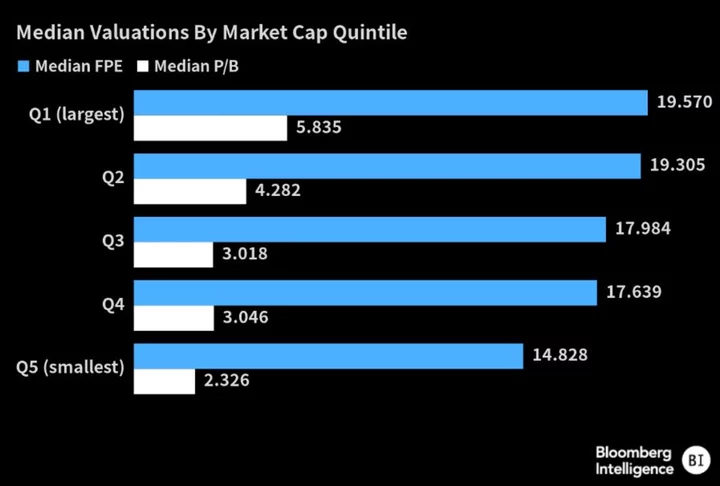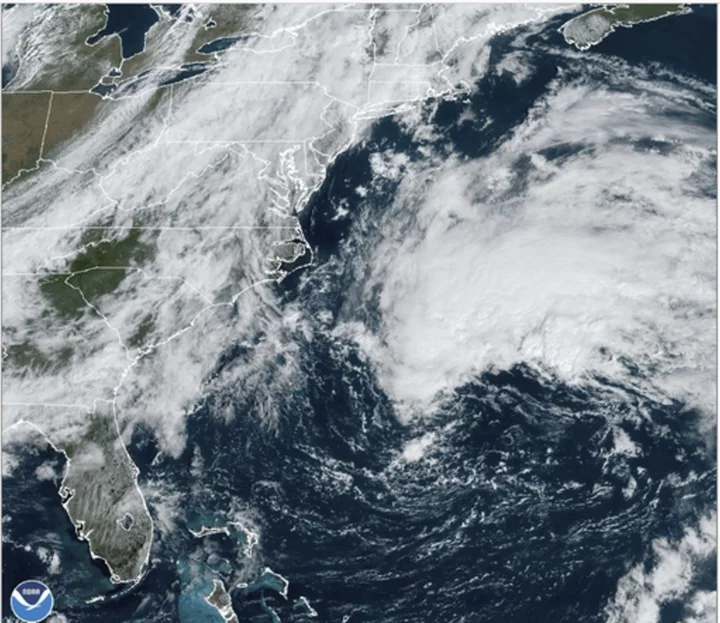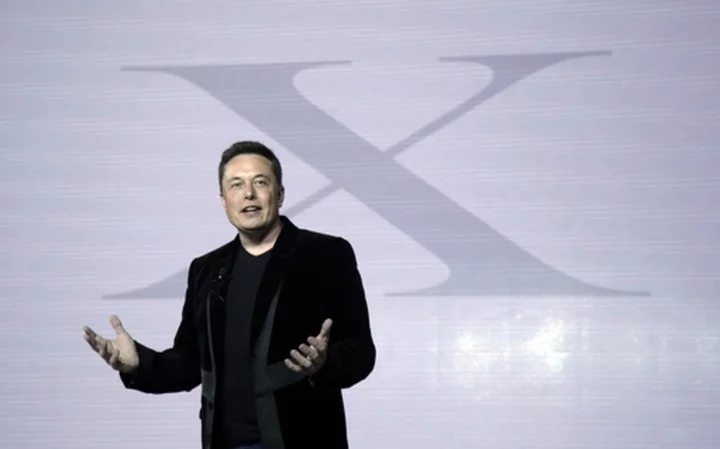No amount of power and prosperity can stop the irritation of getting judged for your borrowing habits, as the world’s biggest economy just experienced.
The US downgrade from AAA by Fitch Ratings this week is just the most high profile episode in a new era of scrutiny over global public finances that deteriorated in the wake of the Covid pandemic.
Rich-world peers from Italy to France and the UK are in the spotlight as higher interest rates impact debt levels exceeding 100% of annual output. Stakes are even higher for capital-hungry developing nations, where potentially ill-timed, negative revisions can push up borrowing costs for years.
Countries run the gauntlet of rating companies because they’re hard-wired into the global investment system. Their uneasy relationship often fuels political ire, even if such assessments just hold up an awkward mirror to governments for decisions taken to keep voters happy.
“Everybody can kind of see what political and economic events are going on in a country, and so credit-rating agencies aren’t really revealing hidden information,” said Alison Johnston of Oregon State University, co-author of a book on ratings companies. “It’s kind of a thankless business, so to speak, because it’s really easy for credit-rating agencies to take the heat if they don’t get it right.”
She reckons the companies are taking a gentler approach in the wake of the pandemic than they did in the years after the 2008 global financial crisis.
That period saw S&P Global Ratings first cut the US from AAA. Both France and the UK began to lose top-rung status around then, while ratings downgrades punctuated the euro region’s debt crisis too.
Moritz Kraemer, the chief economist and head of research at LBBW Bank, recalls the harrowing time when he was the chief global rating officer for sovereign ratings during the euro crisis in the early 2010s.
“This was very, very hard because it was also fueling the intra-eurozone conflict that was between the periphery and the core, which was quite furious at the time,” he said in an interview. “We had analysts which had received death threats and had to be taken to a nondisclosed location for a while.”
Read More: AAA Is No God-Given Right, Says Ex-S&P Analyst Who Cut US in ‘11
Now, years of ultra-low rates have come to an end, just as countries nurse piles of debt built up during the pandemic, and try to meet widening commitments while keeping restless voters at bay.
“Public-sector debt has of course gone up very sharply,” Klaus Baader, global chief economist at Societe Generale SA, told Bloomberg Television. “Longer-term prospects for public-sector debt are poor in pretty much all advanced economies and in many, many emerging economies.”
This year, France was lowered to AA- by Fitch, the fourth-highest notch. It rates the UK at the same level, but with a negative outlook dating from Liz Truss’s disastrous 44 days in office last year. Italy, with debt above 140% of gross domestic product, could be cut to junk at Moody’s Investors Service.
Emerging-market borrowings have swollen drastically too, reaching an all-time high of $100 trillion in the first quarter, led by sovereigns and non-financial companies.
Public Spats
Rating cuts are often met with fury by officials incensed at the accusation that they’re seen as less likely to meet their debt commitments, a sentiment that chimes with the US Treasury’s reaction this week.
The most common rebuttal is to challenge the analysis. When Poland got cut by S&P in 2016 for example, its Finance Ministry said the assessment was “dishonest.”
Pre-emptive criticism falls into this category. In 2011, the Bank of France’s governor, Christian Noyer, told ratings companies that if they wanted to lower France’s top rating, they should downgrade the UK first.
Giorgia Meloni opted for an even earlier rebuttal on Facebook in 2020 — well before she became Italian premier last year — to say that “ratings agencies don’t like political parties that defend the national interest.”
Kraemer was the S&P analyst in 2004 when it first downgraded Italy. “At that point, no rating agency had ever downgraded any eurozone country — and there’s still sort of a flock of Italians who know me by name and sometimes troll me on social media. It’s very personal.”
Other countries choose to shun the assessment altogether. Ukraine stopped talking to Moody’s several years ago, furious that its rating was kept low while S&P and Fitch were raising theirs.
Russian President Vladimir Putin started a homegrown credit-ratings company in 2016 and is no longer assessed by major rivals. El Salvador’s president, Nayib Bukele last year opted for a rude acronym on Twitter to communicate his disdain.
Turkish reactions lurch between being dismissive and annoyed. And in Africa, leaders including Senegalese President Macky Sall have demanded an overhaul of the credit-rating system, complaining that Western prejudice keeps borrowing costs unfairly high. Finance ministers are considering establishing a rating agency as an independent entity of the African Union.
Big Shrug
Timing is a frequent criticism of governments. In the US this week, the common refrain was “Why now?” Highlighting limited investor reaction to downgrades is another. But that’s often because ratings companies are making assessments in slow motion that simply validate what investors have already determined for themselves.
Michel Janna, a former Colombian public credit director and head of sovereign risk Management at Goldman Sachs Group Inc., said that markets most commonly shift well before credit decisions.
“You see depreciations or appreciations of those type of assets way before a ratings agency makes a change on their rating,” he said.
Japan has been downgraded by all three major rating firms for more than a decade, but the actions have had little effect. Since Moody’s Investors Service downgraded China’s debt in 2017 for the first time in three decades, total foreign holdings of Chinese bonds in the interbank market have risen by almost three times. India’s Finance Ministry accused companies in 2021 of “bias and subjectivity.”
Political Weapon
Meanwhile the threat of a downgrade can sometimes become a political weapon. Former UK Chancellor George Osborne cited that as a reason for austerity in 2010. As Israel descended into political upheaval this year after efforts by Prime Minister Benjamin Netanyahu’s to overhaul the judiciary, critics touted the risk of a rating cut against him.
It’s a rare thing for a government to applaud a downgrade, but they’re always enthusiastic when ratings companies go the other way.
In Ireland, which won an upgrade from Moody’s this year, Finance Minister Michael McGrath didn’t hesitate to respond with a statement of applause.
What is clear and established is that ratings companies aren’t infallible, as the global financial crisis experience showed, notoriously so for their actions in awarding lots of top ratings for securitized mortgage debt.
On sovereigns, they have even found themselves forced into embarrassing reversals. Brazil’s upgrade by Moody’s to investment grade in 2009 on the back of a commodities boom lasted only until 2016, for example.
Meanwhile the self-reinforcing nature of downgrades are a particular sensitivity, often because ratings companies were too slow to change their prior assessments.
“If they start to engage in downgrades very suddenly and very severely, that really has the potential to produce a market panic,” said Johnston. “They learned this really well during the European debt crisis, when they were kind of blamed for initiating it.”
For all the prior moments of clumsiness or flawed analysis by ratings companies however, it doesn’t change the overall picture of mounting borrowings that both they and the investors they serve are seeing. Governments may not like the message, but their debt figures tell their own tale.
--With assistance from Ethan Bronner, James Mayger, Clarissa Batino, Claire Jiao, Vrishti Beniwal, Rebecca Choong Wilkins, Guy Johnson, Alix Steel, Dani Burger, Kriti Gupta, Piotr Skolimowski, Chiara Albanese, Zoe Schneeweiss, Galit Altstein, Paul Richardson, Matthew Bristow, Onur Ant and Beril Akman.
(Adds new comments from former head of sovereign ratings starting in eighth paragraph)
Author: Matthew Boesler, Craig Stirling and Paul Abelsky









